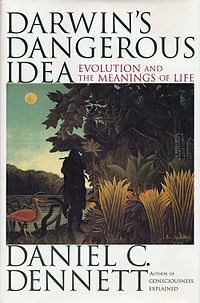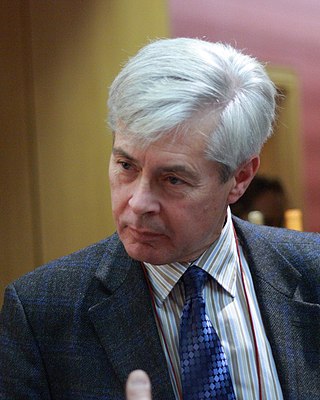
Darwinism is a theory of biological evolution developed by the English naturalist Charles Darwin (1809–1882) and others, stating that all species of organisms arise and develop through the natural selection of small, inherited variations that increase the individual's ability to compete, survive, and reproduce. Also called Darwinian theory, it originally included the broad concepts of transmutation of species or of evolution which gained general scientific acceptance after Darwin published On the Origin of Species in 1859, including concepts which predated Darwin's theories. English biologist Thomas Henry Huxley coined the term Darwinism in April 1860.

Darwin's Dangerous Idea: Evolution and the Meanings of Life is a 1995 book by the philosopher Daniel Dennett, in which the author looks at some of the repercussions of Darwinian theory. The crux of the argument is that, whether or not Darwin's theories are overturned, there is no going back from the dangerous idea that design might not need a designer. Dennett makes this case on the basis that natural selection is a blind process, which is nevertheless sufficiently powerful to explain the evolution of life. Darwin's discovery was that the generation of life worked algorithmically, that processes behind it work in such a way that given these processes the results that they tend toward must be so.
Gertrude Himmelfarb, also known as Bea Kristol, was an American historian. She was a leader of conservative interpretations of history and historiography. She wrote extensively on intellectual history, with a focus on Great Britain and the Victorian era, as well as on contemporary society and culture.
David Charles Stove was an Australian philosopher whose writings often challenged prevailing academic orthodoxy. He was known for his critiques of postmodernism, feminism, and multiculturalism.

Michael Ruse is a British-born Canadian philosopher of science who specializes in the philosophy of biology and works on the relationship between science and religion, the creation–evolution controversy, and the demarcation problem within science. Ruse currently teaches at Florida State University.

Roger Kimball is an American art critic and conservative social commentator. He is the editor and publisher of The New Criterion and the publisher of Encounter Books. Kimball first gained notice in the early 1990s with the publication of his book Tenured Radicals: How Politics Has Corrupted Higher Education.

Janet Radcliffe Richards is a British philosopher specialising in bioethics and feminism and Professor of Practical Philosophy at the University of Oxford. She is the author of The Sceptical Feminist (1980), Philosophical Problems of Equality (1995), Human Nature after Darwin (2000), and The Ethics of Transplants (2012).

Darwinism: An Exposition of the Theory of Natural Selection with Some of Its Applications is an 1889 book on evolution by Alfred Russel Wallace, the co-discoverer of evolution by natural selection together with Charles Darwin. This was a book Wallace wrote as a defensive response to the scientific critics of natural selection. Of all Wallace's books, it is cited by scholarly publications the most.

Peter J. Bowler is a historian of biology who has written extensively on the history of evolutionary thought, the history of the environmental sciences, and on the history of genetics. His 1984 book, Evolution: The History of an Idea is a standard textbook on the history of evolution; a 25th anniversary edition came in 2009. His 1983 book The Eclipse of Darwinism: Anti-Darwinian Evolution Theories in the Decades Around 1900 describes the scientific predominance of other evolutionary theories which led many to minimise the significance of natural selection, in the first part of the twentieth century before genetics was reconciled with natural selection in the modern synthesis.

James Moore is a historian of science at the Open University and the University of Cambridge and visiting scholar at Harvard University, is noted as the author of several biographies of Charles Darwin. As a Cambridge research scholar and a member of the teaching staff at the Open University, he has studied and written about Darwin since the 1970s, co-authoring with Adrian Desmond the major biography Darwin, and also writing The Darwin Legend,The Post-Darwinian Controversies, and many articles and reviews.
Richard Weikart is a professor of history at California State University, Stanislaus, advocate of intelligent design and senior fellow for the Center for Science and Culture of the Discovery Institute. In 1997 he joined the editorial board of the Access Research Network's Origins & Design Journal. Weikart's work focuses on claims about the impact of evolution on social thought, ethics and morality.

The Ape-Man Within is a 1995 science book by L. Sprague de Camp, published in hardcover by Prometheus Books.
Darwinian literary studies is a branch of literary criticism that studies literature in the context of evolution by means of natural selection, including gene-culture coevolution. It represents an emerging trend of neo-Darwinian thought in intellectual disciplines beyond those traditionally considered as evolutionary biology: evolutionary psychology, evolutionary anthropology, behavioral ecology, evolutionary developmental psychology, cognitive psychology, affective neuroscience, behavioural genetics, evolutionary epistemology, and other such disciplines.
Quakers Hill Press is a small press Australian publishing company. It was founded in 1990 by Peter Day, a former US correspondent for The Australian.
Larry Arnhart is a Distinguished Research Professor Emeritus of Political Science at Northern Illinois University in DeKalb, Illinois. He lives in Grand Rapids, Michigan. Arnhart has been described as one of the most prominent advocates of contemporary classical liberalism, along with Milton Friedman, George Stigler, Friedrich Hayek and Thomas Sowell. His areas of teaching and research include the history of political philosophy, biopolitical theory, and American political thought. Arnhart is the author of five books and more than forty peer-reviewed articles.

From Darwin to Hitler: Evolutionary Ethics, Eugenics, and Racism in Germany is a 2004 book by Richard Weikart, a historian at California State University, Stanislaus, and a senior fellow for the Center for Science and Culture of the creationist Discovery Institute. The work is controversial. Graeme Gooday, John M. Lynch, Kenneth G. Wilson, and Constance K. Barsky wrote that "numerous reviews have accused Weikart of selectively viewing his rich primary material, ignoring political, social, psychological, and economic factors" that helped shape Nazi eugenics and racism.
Universal Darwinism, also known as generalized Darwinism, universal selection theory, or Darwinian metaphysics, is a variety of approaches that extend the theory of Darwinism beyond its original domain of biological evolution on Earth. Universal Darwinism aims to formulate a generalized version of the mechanisms of variation, selection and heredity proposed by Charles Darwin, so that they can apply to explain evolution in a wide variety of other domains, including psychology, linguistics, economics, culture, medicine, computer science, and physics.
The history of evolutionary psychology began with Charles Darwin, who said that humans have social instincts that evolved by natural selection. Darwin's work inspired later psychologists such as William James and Sigmund Freud but for most of the 20th century psychologists focused more on behaviorism and proximate explanations for human behavior. E. O. Wilson's landmark 1975 book, Sociobiology, synthesized recent theoretical advances in evolutionary theory to explain social behavior in animals, including humans. Jerome Barkow, Leda Cosmides and John Tooby popularized the term "evolutionary psychology" in their 1992 book The Adapted Mind: Evolutionary Psychology and The Generation of Culture. Like sociobiology before it, evolutionary psychology has been embroiled in controversy, but evolutionary psychologists see their field as gaining increased acceptance overall.
Gary Cziko is an American researcher, and author in the field of educational psychology at the University of Illinois at Urbana–Champaign who has worked on the philosophical model known as perceptual control theory (PCT) – a model whose original developer, William T. Powers, was his mentor. He has written two introductory books on the subject, and in 1995 he introduced the concept of "universal selectionism" into the PCT model.
Cultural evolution is an evolutionary theory of social change. It follows from the definition of culture as "information capable of affecting individuals' behavior that they acquire from other members of their species through teaching, imitation and other forms of social transmission". Cultural evolution is the change of this information over time.










